

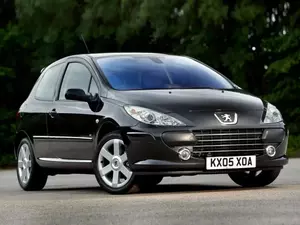
| Engine | 0—60 mph | 0—100 km/h | Top Speed | Averange Economy |
|---|---|---|---|---|
| 1.6i | 10.1 s | 10.6 s | 118 mph | 32 mpg |
| 1.4i | 12.2 s | 12.8 s | 107 mph | 36 mpg |
| 2.0i | 8.4 s | 8.8 s | 137 mph | 28 mpg |
| 1.6 HDi | 11.9 s | 12.5 s | 111 mph | 48 mpg |
| 2.0 HDi | 9.3 s | 9.8 s | 126 mph | 44 mpg |
| Engine | 1.6i |
|---|---|
| 0—60 mph | 10.1 s |
| 0—100 km/h | 10.6 s |
| Top Speed | 118 mph |
| Averange Economy | 32 mpg |
| Engine | 1.4i |
| 0—60 mph | 12.2 s |
| 0—100 km/h | 12.8 s |
| Top Speed | 107 mph |
| Averange Economy | 36 mpg |
| Engine | 2.0i |
| 0—60 mph | 8.4 s |
| 0—100 km/h | 8.8 s |
| Top Speed | 137 mph |
| Averange Economy | 28 mpg |
| Engine | 1.6 HDi |
| 0—60 mph | 11.9 s |
| 0—100 km/h | 12.5 s |
| Top Speed | 111 mph |
| Averange Economy | 48 mpg |
| Engine | 2.0 HDi |
| 0—60 mph | 9.3 s |
| 0—100 km/h | 9.8 s |
| Top Speed | 126 mph |
| Averange Economy | 44 mpg |
In 2005, Peugeot 307 0-60 acceleration was between 8.4 and 12.2 seconds.
Peugeot 307 0-60 mph was up to 28% slower in 2005 than world's average.
In 2005, Peugeot 307 0-60 mph to car weight ratio is shown below:
| Vehicle | Acceleration 0—60 mph (0—100 km/h) | Maximum speed | Acceleration to passenger ratio | Fuel consumption at high speed | Fuel type / gearbox |
|---|---|---|---|---|---|
| 1.6i | 10.1 s to 60 mph (10.6 s to 100 km/h) | 118 mph (190 km/h) | 2 s to 60 mph / person | 41 mpg (5.8 L per 100 km) | Petrol (Gasoline) |
| 1.4i | 12.2 s to 60 mph (12.8 s to 100 km/h) | 107 mph (172 km/h) | 2.4 s to 60 mph / person | 44 mpg (5.3 L per 100 km) | Petrol (Gasoline) |
| 2.0i | 8.4 s to 60 mph (8.8 s to 100 km/h) | 137 mph (220 km/h) | 1.7 s to 60 mph / person | 36 mpg (6.5 L per 100 km) | Petrol (Gasoline) |
| 1.6 HDi | 11.9 s to 60 mph (12.5 s to 100 km/h) | 111 mph (179 km/h) | 2.4 s to 60 mph / person | 55 mpg (4.3 L per 100 km) | Diesel |
| 2.0 HDi | 9.3 s to 60 mph (9.8 s to 100 km/h) | 126 mph (202 km/h) | 1.9 s to 60 mph / person | 52 mpg (4.5 L per 100 km) | Diesel |
| Vehicle | 1.6i |
|---|---|
| Acceleration 0-60 mph (0-100 km/h) | 10.1 s to 60 mph (10.6 s to 100 km/h) |
| Maximum speed | 118 mph (190 km/h) |
| Acceleration to passenger ratio | 2 s to 60 mph / person |
| Fuel consumption at high speed | 41 mpg (5.8 L per 100 km) |
| Fuel type / gearbox | Petrol (Gasoline) |
| Vehicle | 1.4i |
| Acceleration 0-60 mph (0-100 km/h) | 12.2 s to 60 mph (12.8 s to 100 km/h) |
| Maximum speed | 107 mph (172 km/h) |
| Acceleration to passenger ratio | 2.4 s to 60 mph / person |
| Fuel consumption at high speed | 44 mpg (5.3 L per 100 km) |
| Fuel type / gearbox | Petrol (Gasoline) |
| Vehicle | 2.0i |
| Acceleration 0-60 mph (0-100 km/h) | 8.4 s to 60 mph (8.8 s to 100 km/h) |
| Maximum speed | 137 mph (220 km/h) |
| Acceleration to passenger ratio | 1.7 s to 60 mph / person |
| Fuel consumption at high speed | 36 mpg (6.5 L per 100 km) |
| Fuel type / gearbox | Petrol (Gasoline) |
| Vehicle | 1.6 HDi |
| Acceleration 0-60 mph (0-100 km/h) | 11.9 s to 60 mph (12.5 s to 100 km/h) |
| Maximum speed | 111 mph (179 km/h) |
| Acceleration to passenger ratio | 2.4 s to 60 mph / person |
| Fuel consumption at high speed | 55 mpg (4.3 L per 100 km) |
| Fuel type / gearbox | Diesel |
| Vehicle | 2.0 HDi |
| Acceleration 0-60 mph (0-100 km/h) | 9.3 s to 60 mph (9.8 s to 100 km/h) |
| Maximum speed | 126 mph (202 km/h) |
| Acceleration to passenger ratio | 1.9 s to 60 mph / person |
| Fuel consumption at high speed | 52 mpg (4.5 L per 100 km) |
| Fuel type / gearbox | Diesel |

| Engine | 0—60 mph | 0—100 km/h | Top Speed | Averange Economy |
|---|---|---|---|---|
| 2.0 HDi | 9.8 s | 10.3 s | 129 mph | 39 mpg |
| 2.0i | 10.7 s | 11.3 s | 124 mph | 28 mpg |
| 1.6i | 12.1 s | 12.7 s | 119 mph | 31 mpg |
| Engine | 2.0 HDi |
|---|---|
| 0—60 mph | 9.8 s |
| 0—100 km/h | 10.3 s |
| Top Speed | 129 mph |
| Averange Economy | 39 mpg |
| Engine | 2.0i |
| 0—60 mph | 10.7 s |
| 0—100 km/h | 11.3 s |
| Top Speed | 124 mph |
| Averange Economy | 28 mpg |
| Engine | 1.6i |
| 0—60 mph | 12.1 s |
| 0—100 km/h | 12.7 s |
| Top Speed | 119 mph |
| Averange Economy | 31 mpg |
In 2005, Peugeot 307 0-60 acceleration was between 9.8 and 12.1 seconds.
Peugeot 307 0-60 mph was up to 27% slower in 2005 than world's average.
In 2005, Peugeot 307 0-60 mph to car weight ratio is shown below:
| Vehicle | Acceleration 0—60 mph (0—100 km/h) | Maximum speed | Acceleration to passenger ratio | Fuel consumption at high speed | Fuel type / gearbox |
|---|---|---|---|---|---|
| 2.0 HDi | 9.8 s to 60 mph (10.3 s to 100 km/h) | 129 mph (208 km/h) | 4.9 s to 60 mph / person | 46 mpg (5.1 L per 100 km) | Diesel |
| 2.0i | 10.7 s to 60 mph (11.3 s to 100 km/h) | 124 mph (200 km/h) | 5.4 s to 60 mph / person | 37 mpg (6.3 L per 100 km) | Petrol (Gasoline) / 4 |
| 1.6i | 12.1 s to 60 mph (12.7 s to 100 km/h) | 119 mph (191 km/h) | 6.1 s to 60 mph / person | 38 mpg (6.2 L per 100 km) | Petrol (Gasoline) |
| Vehicle | 2.0 HDi |
|---|---|
| Acceleration 0-60 mph (0-100 km/h) | 9.8 s to 60 mph (10.3 s to 100 km/h) |
| Maximum speed | 129 mph (208 km/h) |
| Acceleration to passenger ratio | 4.9 s to 60 mph / person |
| Fuel consumption at high speed | 46 mpg (5.1 L per 100 km) |
| Fuel type / gearbox | Diesel |
| Vehicle | 2.0i |
| Acceleration 0-60 mph (0-100 km/h) | 10.7 s to 60 mph (11.3 s to 100 km/h) |
| Maximum speed | 124 mph (200 km/h) |
| Acceleration to passenger ratio | 5.4 s to 60 mph / person |
| Fuel consumption at high speed | 37 mpg (6.3 L per 100 km) |
| Fuel type / gearbox | Petrol (Gasoline) / 4 |
| Vehicle | 1.6i |
| Acceleration 0-60 mph (0-100 km/h) | 12.1 s to 60 mph (12.7 s to 100 km/h) |
| Maximum speed | 119 mph (191 km/h) |
| Acceleration to passenger ratio | 6.1 s to 60 mph / person |
| Fuel consumption at high speed | 38 mpg (6.2 L per 100 km) |
| Fuel type / gearbox | Petrol (Gasoline) |
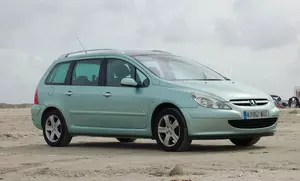
| Engine | 0—60 mph | 0—100 km/h | Top Speed | Averange Economy |
|---|---|---|---|---|
| 2.0 HDi | 10.3 s | 10.8 s | 122 mph | 42 mpg |
| 1.6 HDi | 12.6 s | 13.3 s | 108 mph | 46 mpg |
| Engine | 2.0 HDi |
|---|---|
| 0—60 mph | 10.3 s |
| 0—100 km/h | 10.8 s |
| Top Speed | 122 mph |
| Averange Economy | 42 mpg |
| Engine | 1.6 HDi |
| 0—60 mph | 12.6 s |
| 0—100 km/h | 13.3 s |
| Top Speed | 108 mph |
| Averange Economy | 46 mpg |
In 2005, Peugeot 307 0-60 acceleration was between 10.3 and 12.6 seconds.
Peugeot 307 0-60 mph was up to 32% slower in 2005 than world's average.
In 2005, Peugeot 307 0-60 mph to car weight ratio is shown below:
| Vehicle | Acceleration 0—60 mph (0—100 km/h) | Maximum speed | Acceleration to passenger ratio | Fuel consumption at high speed | Fuel type / gearbox |
|---|---|---|---|---|---|
| 2.0 HDi | 10.3 s to 60 mph (10.8 s to 100 km/h) | 122 mph (197 km/h) | 2.1 s to 60 mph / person | 50 mpg (4.7 L per 100 km) | Diesel |
| 1.6 HDi | 12.6 s to 60 mph (13.3 s to 100 km/h) | 108 mph (174 km/h) | 2.5 s to 60 mph / person | 52 mpg (4.5 L per 100 km) | Diesel |
| Vehicle | 2.0 HDi |
|---|---|
| Acceleration 0-60 mph (0-100 km/h) | 10.3 s to 60 mph (10.8 s to 100 km/h) |
| Maximum speed | 122 mph (197 km/h) |
| Acceleration to passenger ratio | 2.1 s to 60 mph / person |
| Fuel consumption at high speed | 50 mpg (4.7 L per 100 km) |
| Fuel type / gearbox | Diesel |
| Vehicle | 1.6 HDi |
| Acceleration 0-60 mph (0-100 km/h) | 12.6 s to 60 mph (13.3 s to 100 km/h) |
| Maximum speed | 108 mph (174 km/h) |
| Acceleration to passenger ratio | 2.5 s to 60 mph / person |
| Fuel consumption at high speed | 52 mpg (4.5 L per 100 km) |
| Fuel type / gearbox | Diesel |
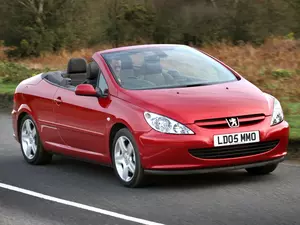
| Engine | 0—60 mph | 0—100 km/h | Top Speed | Averange Economy |
|---|---|---|---|---|
| 2.0 i 16V RC | 8.9 s | 9.4 s | 127 mph | 27 mpg |
| 2.0 i 16V | 12.1 s | 12.7 s | 127 mph | 26 mpg |
| Engine | 2.0 i 16V RC |
|---|---|
| 0—60 mph | 8.9 s |
| 0—100 km/h | 9.4 s |
| Top Speed | 127 mph |
| Averange Economy | 27 mpg |
| Engine | 2.0 i 16V |
| 0—60 mph | 12.1 s |
| 0—100 km/h | 12.7 s |
| Top Speed | 127 mph |
| Averange Economy | 26 mpg |
In 2003, Peugeot 307 0-60 acceleration was between 8.9 and 12.1 seconds.
Peugeot 307 0-60 mph was up to 27% slower in 2003 than world's average.
In 2003, Peugeot 307 0-60 mph to car weight ratio is shown below:
| Vehicle | Acceleration 0—60 mph (0—100 km/h) | Maximum speed | Acceleration to passenger ratio | Fuel consumption at high speed | Fuel type / gearbox |
|---|---|---|---|---|---|
| 2.0 i 16V RC | 8.9 s to 60 mph (9.4 s to 100 km/h) | 127 mph (205 km/h) | 4.5 s to 60 mph / person | 35 mpg (6.8 L per 100 km) | Petrol (Gasoline) |
| 2.0 i 16V | 12.1 s to 60 mph (12.7 s to 100 km/h) | 127 mph (204 km/h) | 6.1 s to 60 mph / person | 37 mpg (6.4 L per 100 km) | Petrol (Gasoline) / 4 |
| Vehicle | 2.0 i 16V RC |
|---|---|
| Acceleration 0-60 mph (0-100 km/h) | 8.9 s to 60 mph (9.4 s to 100 km/h) |
| Maximum speed | 127 mph (205 km/h) |
| Acceleration to passenger ratio | 4.5 s to 60 mph / person |
| Fuel consumption at high speed | 35 mpg (6.8 L per 100 km) |
| Fuel type / gearbox | Petrol (Gasoline) |
| Vehicle | 2.0 i 16V |
| Acceleration 0-60 mph (0-100 km/h) | 12.1 s to 60 mph (12.7 s to 100 km/h) |
| Maximum speed | 127 mph (204 km/h) |
| Acceleration to passenger ratio | 6.1 s to 60 mph / person |
| Fuel consumption at high speed | 37 mpg (6.4 L per 100 km) |
| Fuel type / gearbox | Petrol (Gasoline) / 4 |
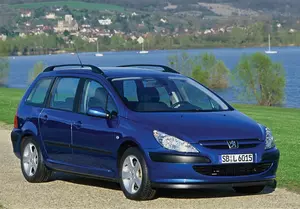
| Engine | 0—60 mph | 0—100 km/h | Top Speed | Averange Economy |
|---|---|---|---|---|
| 1.6 HDI | 11.4 s | 12 s | 114 mph | 47 mpg |
| 1.6 16 V | 13.1 s | 13.8 s | 112 mph | 28 mpg |
| 2.0 16V | 10.9 s | 11.5 s | 124 mph | 27 mpg |
| 2.0 HDi | 13 s | 13.7 s | 108 mph | 44 mpg |
| Engine | 1.6 HDI |
|---|---|
| 0—60 mph | 11.4 s |
| 0—100 km/h | 12 s |
| Top Speed | 114 mph |
| Averange Economy | 47 mpg |
| Engine | 1.6 16 V |
| 0—60 mph | 13.1 s |
| 0—100 km/h | 13.8 s |
| Top Speed | 112 mph |
| Averange Economy | 28 mpg |
| Engine | 2.0 16V |
| 0—60 mph | 10.9 s |
| 0—100 km/h | 11.5 s |
| Top Speed | 124 mph |
| Averange Economy | 27 mpg |
| Engine | 2.0 HDi |
| 0—60 mph | 13 s |
| 0—100 km/h | 13.7 s |
| Top Speed | 108 mph |
| Averange Economy | 44 mpg |
In 2002, Peugeot 307 0-60 acceleration was between 10.9 and 13.1 seconds.
Peugeot 307 0-60 mph was up to 38% slower in 2002 than world's average.
In 2002, Peugeot 307 0-60 mph to car weight ratio is shown below:
| Vehicle | Acceleration 0—60 mph (0—100 km/h) | Maximum speed | Acceleration to passenger ratio | Fuel consumption at high speed | Fuel type / gearbox |
|---|---|---|---|---|---|
| 1.6 HDI | 11.4 s to 60 mph (12 s to 100 km/h) | 114 mph (183 km/h) | 2.3 s to 60 mph / person | 53 mpg (4.4 L per 100 km) | Diesel |
| 1.6 16 V | 13.1 s to 60 mph (13.8 s to 100 km/h) | 112 mph (180 km/h) | 2.6 s to 60 mph / person | 37 mpg (6.4 L per 100 km) | Petrol (Gasoline) / 4 |
| 2.0 16V | 10.9 s to 60 mph (11.5 s to 100 km/h) | 124 mph (200 km/h) | 2.2 s to 60 mph / person | 36 mpg (6.5 L per 100 km) | Petrol (Gasoline) / 4 |
| 2.0 HDi | 13 s to 60 mph (13.7 s to 100 km/h) | 108 mph (174 km/h) | 2.6 s to 60 mph / person | 52 mpg (4.5 L per 100 km) | Diesel |
| Vehicle | 1.6 HDI |
|---|---|
| Acceleration 0-60 mph (0-100 km/h) | 11.4 s to 60 mph (12 s to 100 km/h) |
| Maximum speed | 114 mph (183 km/h) |
| Acceleration to passenger ratio | 2.3 s to 60 mph / person |
| Fuel consumption at high speed | 53 mpg (4.4 L per 100 km) |
| Fuel type / gearbox | Diesel |
| Vehicle | 1.6 16 V |
| Acceleration 0-60 mph (0-100 km/h) | 13.1 s to 60 mph (13.8 s to 100 km/h) |
| Maximum speed | 112 mph (180 km/h) |
| Acceleration to passenger ratio | 2.6 s to 60 mph / person |
| Fuel consumption at high speed | 37 mpg (6.4 L per 100 km) |
| Fuel type / gearbox | Petrol (Gasoline) / 4 |
| Vehicle | 2.0 16V |
| Acceleration 0-60 mph (0-100 km/h) | 10.9 s to 60 mph (11.5 s to 100 km/h) |
| Maximum speed | 124 mph (200 km/h) |
| Acceleration to passenger ratio | 2.2 s to 60 mph / person |
| Fuel consumption at high speed | 36 mpg (6.5 L per 100 km) |
| Fuel type / gearbox | Petrol (Gasoline) / 4 |
| Vehicle | 2.0 HDi |
| Acceleration 0-60 mph (0-100 km/h) | 13 s to 60 mph (13.7 s to 100 km/h) |
| Maximum speed | 108 mph (174 km/h) |
| Acceleration to passenger ratio | 2.6 s to 60 mph / person |
| Fuel consumption at high speed | 52 mpg (4.5 L per 100 km) |
| Fuel type / gearbox | Diesel |
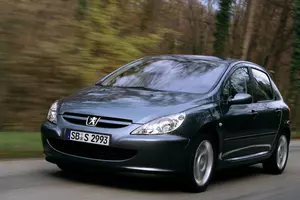
| Engine | 0—60 mph | 0—100 km/h | Top Speed | Averange Economy |
|---|---|---|---|---|
| 1.4 | 13.9 s | 14.6 s | 104 mph | 35 mpg |
| 1.4 HDi | 15.7 s | 16.5 s | 99 mph | 52 mpg |
| 1.6 | 10.5 s | 11 s | 118 mph | 33 mpg |
| 2.0 | 8.7 s | 9.2 s | 127 mph | 30 mpg |
| 1.4 i 16V | 12.2 s | 12.8 s | 107 mph | 36 mpg |
| 1.6 HDi | 10.6 s | 11.2 s | 117 mph | 48 mpg |
| 2.0 HDI | 9.3 s | 9.8 s | 126 mph | 44 mpg |
| 2.0 HDi | 10.4 s | 10.9 s | 117 mph | 45 mpg |
| Engine | 1.4 |
|---|---|
| 0—60 mph | 13.9 s |
| 0—100 km/h | 14.6 s |
| Top Speed | 104 mph |
| Averange Economy | 35 mpg |
| Engine | 1.4 HDi |
| 0—60 mph | 15.7 s |
| 0—100 km/h | 16.5 s |
| Top Speed | 99 mph |
| Averange Economy | 52 mpg |
| Engine | 1.6 |
| 0—60 mph | 10.5 s |
| 0—100 km/h | 11 s |
| Top Speed | 118 mph |
| Averange Economy | 33 mpg |
| Engine | 2.0 |
| 0—60 mph | 8.7 s |
| 0—100 km/h | 9.2 s |
| Top Speed | 127 mph |
| Averange Economy | 30 mpg |
| Engine | 1.4 i 16V |
| 0—60 mph | 12.2 s |
| 0—100 km/h | 12.8 s |
| Top Speed | 107 mph |
| Averange Economy | 36 mpg |
| Engine | 1.6 HDi |
| 0—60 mph | 10.6 s |
| 0—100 km/h | 11.2 s |
| Top Speed | 117 mph |
| Averange Economy | 48 mpg |
| Engine | 2.0 HDI |
| 0—60 mph | 9.3 s |
| 0—100 km/h | 9.8 s |
| Top Speed | 126 mph |
| Averange Economy | 44 mpg |
| Engine | 2.0 HDi |
| 0—60 mph | 10.4 s |
| 0—100 km/h | 10.9 s |
| Top Speed | 117 mph |
| Averange Economy | 45 mpg |
In 2001, Peugeot 307 0-60 acceleration was between 8.7 and 15.7 seconds.
Peugeot 307 0-60 mph was up to 65% slower in 2001 than world's average.
In 2001, Peugeot 307 0-60 mph to car weight ratio is shown below:
| Vehicle | Acceleration 0—60 mph (0—100 km/h) | Maximum speed | Acceleration to passenger ratio | Fuel consumption at high speed | Fuel type / gearbox |
|---|---|---|---|---|---|
| 1.4 | 13.9 s to 60 mph (14.6 s to 100 km/h) | 104 mph (167 km/h) | 2.8 s to 60 mph / person | 43 mpg (5.5 L per 100 km) | Petrol (Gasoline) |
| 1.4 HDi | 15.7 s to 60 mph (16.5 s to 100 km/h) | 99 mph (160 km/h) | 3.1 s to 60 mph / person | 59 mpg (4 L per 100 km) | Diesel |
| 1.6 | 10.5 s to 60 mph (11 s to 100 km/h) | 118 mph (190 km/h) | 2.1 s to 60 mph / person | 41 mpg (5.8 L per 100 km) | Petrol (Gasoline) |
| 2.0 | 8.7 s to 60 mph (9.2 s to 100 km/h) | 127 mph (205 km/h) | 1.7 s to 60 mph / person | 38 mpg (6.2 L per 100 km) | Petrol (Gasoline) |
| 1.4 i 16V | 12.2 s to 60 mph (12.8 s to 100 km/h) | 107 mph (172 km/h) | 2.4 s to 60 mph / person | 44 mpg (5.3 L per 100 km) | Petrol (Gasoline) |
| 1.6 HDi | 10.6 s to 60 mph (11.2 s to 100 km/h) | 117 mph (188 km/h) | 2.1 s to 60 mph / person | 55 mpg (4.3 L per 100 km) | Diesel |
| 2.0 HDI | 9.3 s to 60 mph (9.8 s to 100 km/h) | 126 mph (202 km/h) | 1.9 s to 60 mph / person | 52 mpg (4.5 L per 100 km) | Diesel |
| 2.0 HDi | 10.4 s to 60 mph (10.9 s to 100 km/h) | 117 mph (188 km/h) | 2.1 s to 60 mph / person | 56 mpg (4.2 L per 100 km) | Diesel |
| Vehicle | 1.4 |
|---|---|
| Acceleration 0-60 mph (0-100 km/h) | 13.9 s to 60 mph (14.6 s to 100 km/h) |
| Maximum speed | 104 mph (167 km/h) |
| Acceleration to passenger ratio | 2.8 s to 60 mph / person |
| Fuel consumption at high speed | 43 mpg (5.5 L per 100 km) |
| Fuel type / gearbox | Petrol (Gasoline) |
| Vehicle | 1.4 HDi |
| Acceleration 0-60 mph (0-100 km/h) | 15.7 s to 60 mph (16.5 s to 100 km/h) |
| Maximum speed | 99 mph (160 km/h) |
| Acceleration to passenger ratio | 3.1 s to 60 mph / person |
| Fuel consumption at high speed | 59 mpg (4 L per 100 km) |
| Fuel type / gearbox | Diesel |
| Vehicle | 1.6 |
| Acceleration 0-60 mph (0-100 km/h) | 10.5 s to 60 mph (11 s to 100 km/h) |
| Maximum speed | 118 mph (190 km/h) |
| Acceleration to passenger ratio | 2.1 s to 60 mph / person |
| Fuel consumption at high speed | 41 mpg (5.8 L per 100 km) |
| Fuel type / gearbox | Petrol (Gasoline) |
| Vehicle | 2.0 |
| Acceleration 0-60 mph (0-100 km/h) | 8.7 s to 60 mph (9.2 s to 100 km/h) |
| Maximum speed | 127 mph (205 km/h) |
| Acceleration to passenger ratio | 1.7 s to 60 mph / person |
| Fuel consumption at high speed | 38 mpg (6.2 L per 100 km) |
| Fuel type / gearbox | Petrol (Gasoline) |
| Vehicle | 1.4 i 16V |
| Acceleration 0-60 mph (0-100 km/h) | 12.2 s to 60 mph (12.8 s to 100 km/h) |
| Maximum speed | 107 mph (172 km/h) |
| Acceleration to passenger ratio | 2.4 s to 60 mph / person |
| Fuel consumption at high speed | 44 mpg (5.3 L per 100 km) |
| Fuel type / gearbox | Petrol (Gasoline) |
| Vehicle | 1.6 HDi |
| Acceleration 0-60 mph (0-100 km/h) | 10.6 s to 60 mph (11.2 s to 100 km/h) |
| Maximum speed | 117 mph (188 km/h) |
| Acceleration to passenger ratio | 2.1 s to 60 mph / person |
| Fuel consumption at high speed | 55 mpg (4.3 L per 100 km) |
| Fuel type / gearbox | Diesel |
| Vehicle | 2.0 HDI |
| Acceleration 0-60 mph (0-100 km/h) | 9.3 s to 60 mph (9.8 s to 100 km/h) |
| Maximum speed | 126 mph (202 km/h) |
| Acceleration to passenger ratio | 1.9 s to 60 mph / person |
| Fuel consumption at high speed | 52 mpg (4.5 L per 100 km) |
| Fuel type / gearbox | Diesel |
| Vehicle | 2.0 HDi |
| Acceleration 0-60 mph (0-100 km/h) | 10.4 s to 60 mph (10.9 s to 100 km/h) |
| Maximum speed | 117 mph (188 km/h) |
| Acceleration to passenger ratio | 2.1 s to 60 mph / person |
| Fuel consumption at high speed | 56 mpg (4.2 L per 100 km) |
| Fuel type / gearbox | Diesel |